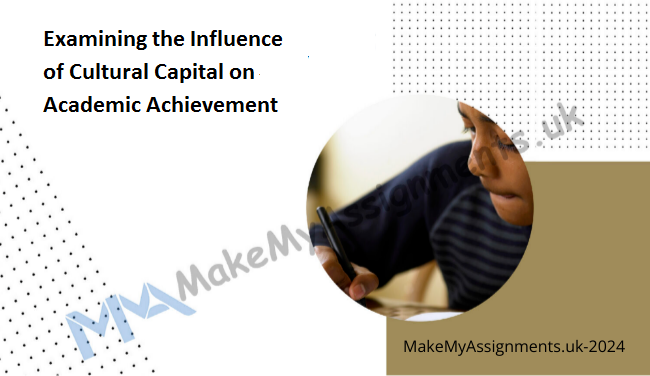Preparing a law assignment is no easy task. Students pursuing law often find themselves juggling…

Examining the Influence of Cultural Capital on Academic Achievement
In the realm of education, various factors contribute to students’ academic success. Beyond innate intelligence and effort, one significant but often overlooked aspect is cultural capital. Cultural capital refers to the non-financial social assets that promote social mobility beyond economic means, including knowledge, skills, education, and the cultural norms and values that facilitate success in society. Examining the influence of cultural capital on academic achievement unveils the intricate interplay between social background and educational outcomes.

Understanding Cultural Capital: French sociologist Pierre Bourdieu first introduced the concept of cultural capital in the 1970s as part of his theory of social reproduction. He argued that individuals from privileged backgrounds possess cultural resources—such as familiarity with high culture, language proficiency, and access to education—that provide them with advantages in academic settings. These advantages, acquired through upbringing and socialization, often translate into better academic performance and future opportunities.
Types of Cultural Capital: Cultural capital can be classified into three main forms: embodied, objectified, and institutionalized. Embodied cultural capital encompasses the skills, knowledge, and habits individuals internalize through socialization, such as language fluency, communication skills, and learning strategies. Objectified cultural capital refers to material goods and resources that symbolize cultural value, such as books, art, and educational materials. Institutionalized cultural capital pertains to formal recognition and credentials, such as degrees, certificates, and qualifications, which confer social status and legitimacy.
Impact on Academic Achievement: The influence of cultural capital on academic achievement manifests in various ways. Students from culturally affluent backgrounds often possess greater academic preparedness, having been exposed to enriching educational experiences and resources from an early age. They may have access to educational materials, private tutoring, extracurricular activities, and cultural institutions that foster intellectual development and critical thinking skills. Moreover, their familiarity with academic discourse and cultural norms may facilitate communication with teachers and peers, enhancing their learning experience and academic performance.
Conversely, students from disadvantaged backgrounds may face barriers to academic success due to limited access to cultural capital. Economic constraints may restrict their access to educational resources, cultural experiences, and academic support services. Additionally, linguistic and cultural differences between home and school environments can create challenges in academic engagement and comprehension. Without adequate support systems and exposure to enriching experiences, these students may struggle to perform at the same level as their more privileged peers.
Addressing Inequality: The role of cultural capital in perpetuating educational inequality underscores the importance of addressing systemic barriers to access and opportunity. Educational institutions must strive to create inclusive learning environments that recognize and value diverse forms of cultural capital. This includes implementing equitable resource allocation, providing targeted support for students from disadvantaged backgrounds, and promoting cultural awareness and sensitivity among educators.
Furthermore, fostering partnerships between schools, families, and communities can facilitate the exchange of cultural capital and promote collaborative efforts to support student success. By leveraging the strengths of diverse cultural backgrounds and promoting social inclusion, educators can mitigate the influence of cultural capital on academic achievement and cultivate environments where all students can thrive.
In the quest for academic achievement, leveraging cultural capital becomes paramount, especially for students navigating diverse educational landscapes. MakeMyAssignments.uk, a leading online academic assistance platform, recognizes the significance of cultural capital and is committed to empowering students from all backgrounds to excel academically. Through a range of services tailored to individual needs, MakeMyAssignments.uk facilitates access to resources, support, and expertise, thereby leveling the playing field and fostering academic success for all.
Cultural Capital-Informed Services:
- Customized Assistance: MakeMyAssignments.uk offers personalized academic support tailored to students’ unique backgrounds and learning needs. Recognizing the influence of embodied cultural capital, their team of experienced tutors and writers provides targeted guidance and resources to help students develop essential skills, enhance their academic performance, and bridge any knowledge gaps.
- Enriching Resources: Objectified cultural capital, such as books, educational materials, and reference sources, plays a crucial role in shaping students’ academic journeys. MakeMyAssignments.uk provides access to a vast repository of scholarly resources, ensuring that students have the tools they need to excel in their studies. Whether it’s research papers, textbooks, or study guides, these resources enrich students’ learning experiences and expand their intellectual horizons.
- Academic Support Services: For students facing institutionalized barriers to academic success, such as language barriers or lack of institutional recognition, MakeMyAssignments.uk offers comprehensive support services. From proofreading and editing to language translation and formatting assistance, their team assists students in overcoming obstacles and achieving academic excellence, irrespective of their cultural background or linguistic proficiency.
- Culturally Responsive Approach: MakeMyAssignments.uk adopts a culturally responsive approach to academic support, acknowledging and valuing the diverse cultural backgrounds of their clientele. By fostering an inclusive learning environment that respects and celebrates cultural diversity, they create a space where students feel empowered to engage meaningfully with their studies and express themselves authentically.
- Community Engagement: Recognizing the importance of collaboration between schools, families, and communities in fostering academic success, MakeMyAssignments.uk actively engages with stakeholders to promote educational equity and social inclusion. Through partnerships with schools, community organizations, and advocacy groups, they facilitate the exchange of cultural capital and support initiatives aimed at addressing systemic barriers to academic achievement.
MakeMyAssignments.uk stands at the forefront of empowering students to leverage cultural capital for academic success. By providing customized assistance, enriching resources, comprehensive support services, and a culturally responsive approach, they enable students from diverse backgrounds to thrive in their academic pursuits. Through their commitment to inclusivity, community engagement, and educational equity, MakeMyAssignments.uk exemplifies how leveraging cultural capital can transform the educational landscape and empower students to realize their full potential, regardless of their social background or circumstances.




This Post Has 0 Comments